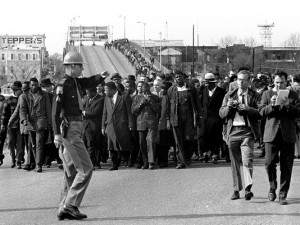(ThyBlackMan.com) I remember back in 1999 when my daughter came to me crying about something she had seen on TV. It was the movie, “Selma, Lord, Selma!” She was distraught, even at six years old, at the mistreatment of Black folks in Selma in 1965. My daughter related to Jurnee Smollett and Stephanie Peyton in their portrayals of Sheyann and Rachel, two young girls growing up in Selma during that time. That being a teaching moment, she and I had a talk about Selma and other issues pertaining to injustice toward and mistreatment of Black people in this country.
Adding to the title of that movie, by making it “Selma, Lord have mercy, Selma!” captures my effort to highlight and reemphasize not only the historical tragedy of Selma but also its current political and economic condition in light of the 50th anniversary of Bloody Sunday.
Last week, March 3-7, 2015, tens of thousands of people converged on Selma, including politicians, of course, celebrities and corporate executives. Selma enjoyed the national and world spotlight for a brief time, but I wondered if those folks would leave Selma without addressing current critical issues that exist there. Daily life in Selma includes a 40% poverty rate, high unemployment, low median family income, crumbling infrastructure and building facades, and closed businesses.
I can only pray that some of the folks who visited and made speeches also left some money there, maybe to start a micro lending fund, an equity fund, or even invested in a business in Selma. I hope the politicians who say they hold Selma in such high esteem went back to their respective offices committed to allocate funds to help the city that some refer to as, “The Third World of Alabama.”
As Representative Terri A. Sewell (D-Ala) said, “We have to move beyond the bridge.” Along with all the crying, preaching, inspiring speeches, and marching back across the bridge, I trust that on this 50th anniversary of Bloody Sunday the folks living in Selma received more than just well wishes.
During our family visit there in 2001, former head of the National Voting Rights Museum and Institute, Joann Bland, gave us a tour (Even though it was past closing time); she told her personal story of being in the march at 10 years of age and shared her wealth of knowledge with my then 8-year old daughter. My eyes were opened to the history and the present state of Selma, a city still waiting for change, especially economic change.
Fifty years since 1965 that famous bridge, named for Edmund Pettus, a former U.S. Democratic Senator, chairman of the state delegation to the Democratic National Convention for twenty years, and Grand Dragon of the Alabama Ku Klux Klan, has even greater meaning. Back then it symbolized the struggle for voting rights; today it is a guidepost for a new struggle, the struggle for economic justice and empowerment. Those who walked that bridge in 1965 won their battle; we must be as strong and as determined as they were then to win the battle we face today.
Obviously the political environment has changed in the city that elected as its Mayor the sheriff who supported the beat-down in 1965, and kept him in office until 2000.
Selma leaders like Terri Sewell know, however, that political change is not enough; they know change must also come in the form of economic empowerment and federal support.
Is it enough to have gone to Selma simply because it was the 50th anniversary? Albeit a treasured occasion, for some it has become more symbolism than substantive, a photo-op, just as the 50th anniversary of the famous March on Washington was in 2013. Today our words and activities in Selma must result in progressive and appropriate action, so that next year we can celebrate the victorious culmination of that revered freedom march, rather than lamenting our continued frustration over the fact that 50 years later, as some of the dignitaries said, “Our march for justice continues.”
Selma needs much more than an annual celebration. It needs economic development, businesses, employment, and revitalization. It should be valued well beyond the platitudes, pretentiousness, and pontification proffered by politicians and their pundits. That city, so important to our history, should be held in the highest esteem by Washington D.C., the State of Alabama, and the rest of us. In addition to an annual spotlight, we must keep it on the political radar screen throughout the year, until it is given the assistance it certainly commands and truly deserves.
The culmination of true freedom is economic freedom. Selma citizens and those who endured the batons, horses, dogs, and those who were murdered leading up to and during the march, are certainly deserving of more than 50 more years of “We ‘shall’ overcome.”
Written By James E. Clingman
Official website; http://www.blackonomics.com/

















Leave a Reply